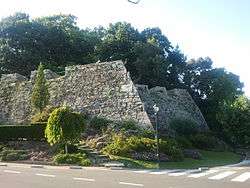Castro fortress
| Castro Fortress | |
|---|---|
| Fortaleza do Castro | |
|
Galicia Near Vigo in Spain | |
|
One of the walls of Fortress | |
 Fortress Castro Location in Spain | |
| Coordinates | 42°13′55.90″N 8°43′38.78″W / 42.2321944°N 8.7274389°WCoordinates: 42°13′55.90″N 8°43′38.78″W / 42.2321944°N 8.7274389°W |
| Type | Fortification |
| Site information | |
| Open to the public | Yes |
| Site history | |
| Built | 1665 |
| Built by | Engineer Colonel Fernando de Gourannanbergue |
| Battles/wars | Battle of Vigo Bay, Peninsular War |
The fortress of the Castro was built in 1665 during a war in front of Portugal (1640-1668) trying to protect the city from the continuous attacks coming from the British navy allies of Portugal.
The defensive system of the city consisted in Castro and San Sebastián fortress and the city wall (now disappear). The city wall had an irregular structure because of the orography, it was constructed by the Engineer Colonel Fernando de Gourannanbergue and the Field Master Diego Arias Taboada to unify the two fortresses. Despite of this effort to provide security to the city, Documents from that time say that this defensive system was not so effective because it can not stop landings.
After several attempts to improve the defenses of the city, Vigo was looted again by British navy during Battle of Vigo Bay (October 23-24 of 1702) at the War of the Spanish Succession.
In 1809 the fortress was occupied by the French army during Peninsular War, on March 28 of this year, the fortress was reconquered after a heroic battle by people of Vigo themselves, because of this battle the city won the title of "Faithful, Loyal and Courageous".
Nowadays this fortress is one of the preferred sites for people to take a walk in Vigo, because his beautiful gardens, open spaces, fonts and also the privileged views.
Gallery
-

Part of the internal garden of the fortress
-

Part of the internal garden and "cruceiro" of the fortress
-

One of the entries of the second wall
-

One of the entries of the first wall
External links
- Map and Description
- Information Spanish
- More Photos Spanish
- Castro Fortress at Google Maps
